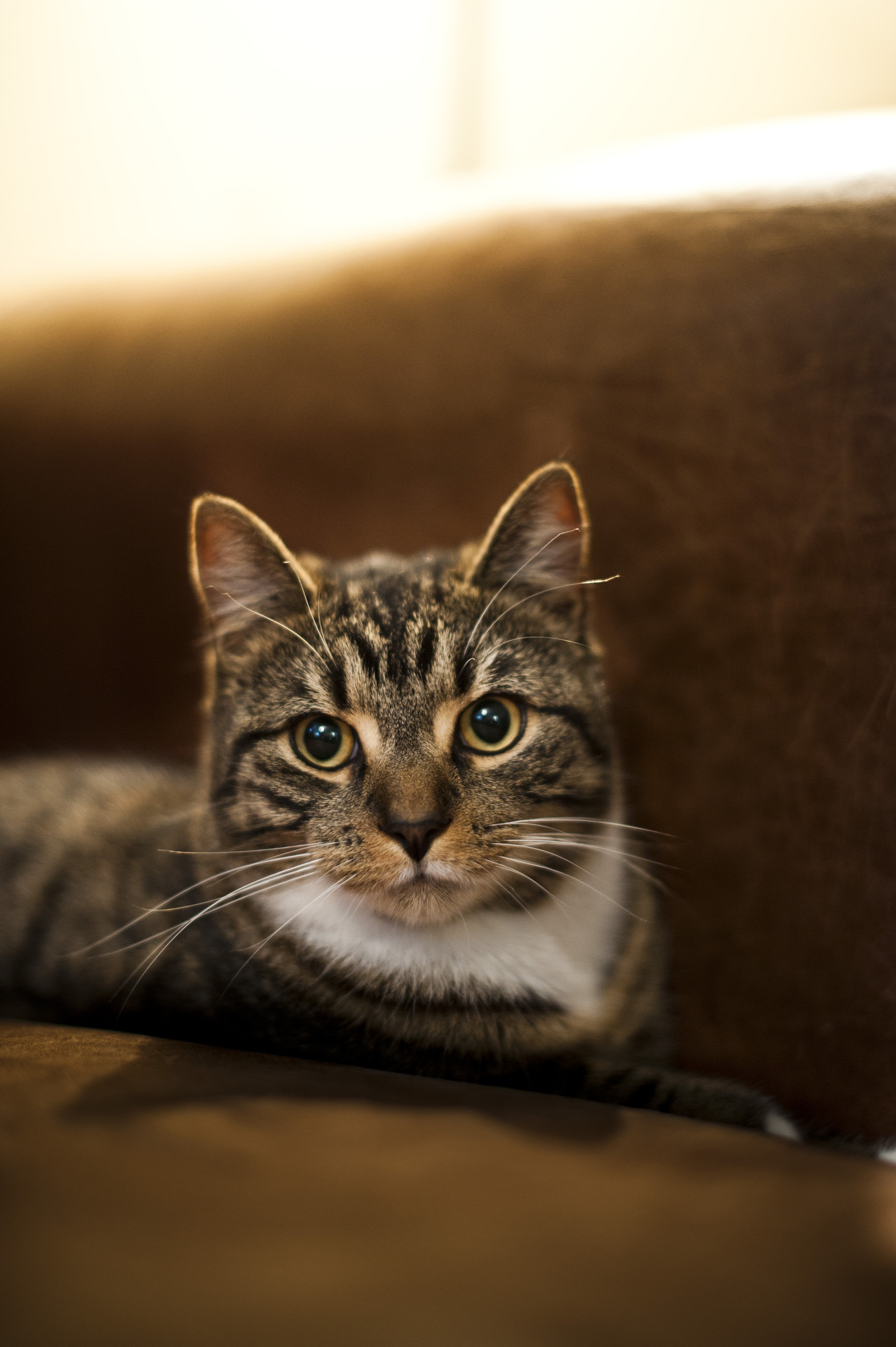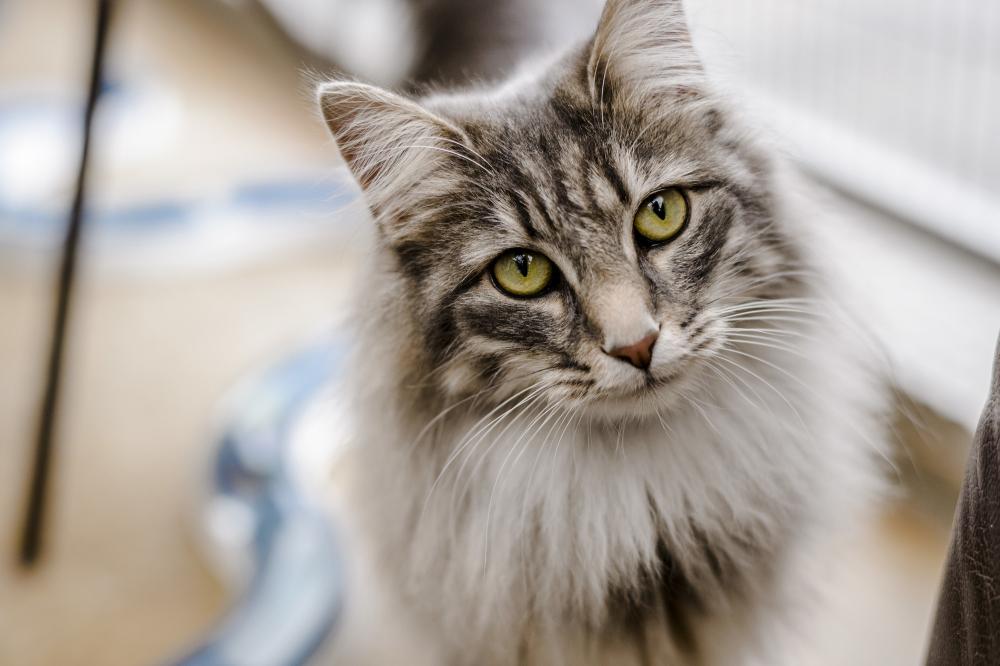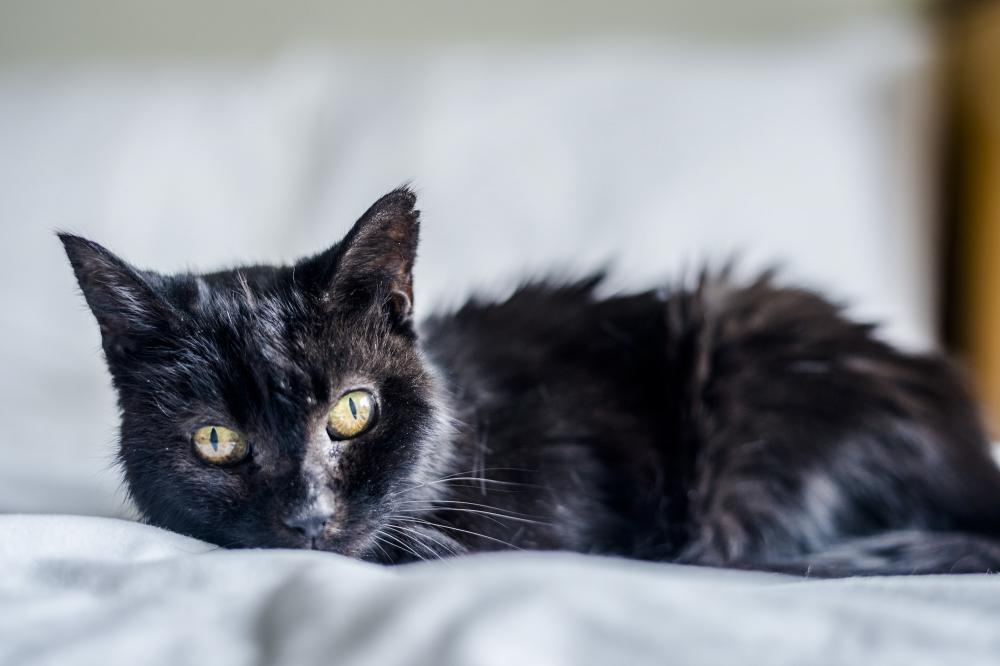
Caring for older cats
As with people, cats slow down as they age. They may want to take less exercise, they may start to put on weight and their personality may change. Some cats become friendlier and want to spend more time with their owners. Others become grumpier and do not like being touched. Many cats sleep more and go out less. However, changes in personality can be a sign of pain or illness so it is worth checking with your vet. Don't forget that older cats still need regular vaccination, flea and worming treatment.
What happens during ageing?
Ageing affects the skin and it becomes less elastic. The coat loses its shine and white hairs may appear. Hearing and sight deteriorate and your pet’s memory may be affected. Sleep patterns often change as many older cats sleep more, although some become wakeful at night.
The muscles and bones become weaker and the immune system does not work as well, so your pet becomes less capable of fighting off infection. Internal organs such as the heart, liver and the kidneys can deteriorate. Other changes make the mouth drier and swallowing can be more difficult.
However, improvements in medicine mean that there are treatments available to help reduce the worst effects. Age is not a reason to accept ill health and even old cats can lead happy, active lives. Keeping your cat mentally active may help to keep them feeling young – try hiding titbits for them to find round the house, but make it easy at first to avoid frustration. Try new toys as even older cats like to play.
When do cats start to get old?
Middle age for most cats is now generally considered to start at seven years. Many vets are now starting to provide “senior care” programmes and these are worth considering. Picking up early changes in your pet enables early diagnosis and treatment and may considerably improve quality of life.
As your cat ages, it's kind to provide an indoor litter tray, even if your cat normally toilets outdoors. Because they must be slower on their feet, older cats may feel vulnerable outside and providing an indoor tray will help prevent toileting problems. Ones with low sides that are easy to step into are best.
Feeding the older cat
Throughout its life, it is a good idea to weigh your cat every one to two months. If weight is steadily increasing after 12 months of age, you need to start reducing your cat’s food. Weight loss can be an early sign of illness, so check with your vet.
It is common for older cats to develop medical conditions that cause them to lose weight, such as kidney and thyroid disease. If your cat is losing weight, it is important to consult your vet as soon as possible. Other cats acquire a middle-aged spread and it is essential that this be kept under control. Overweight cats are unlikely to live as long and they are prone to serious illnesses such as kidney disease, diabetes and arthritis.
Cats vary in size from petite to large, so weight alone doesn't tell you much. The only way to tell if your pet is overweight is to examine it carefully. Can you see an hourglass waist when viewed from above? Can you feel your pet’s ribs with light finger pressure? If the answer to these questions is “no”, it is time to reduce food intake. And if your pet has a potbelly as well, it is definitely time to go on a diet. However, crash dieting is dangerous for cats.
It may be better to follow one of the many senior diets, as they are lower in calories and reduce the likelihood of weight gain. Protein restriction has not been proven to be beneficial for healthy cats, but is helpful for cats with kidney problems. If your cat has kidney disease ask your vet for advice on a suitable diet.
Anti-oxidants and supplementation with polyunsaturated oils (as provided by some of the senior diets) may be beneficial, but again there is no proof. It’s best to seek the advice of your vet.
If your cat is losing weight you should consult your vet in case there is an underlying medical problem and discuss whether following a senior diet is advisable. The vet may suggest special foods and, if appetite is poor, it may help to feed little and often, warm the food or add a small quantity of pilchards or sardines.
Adding vegetable oil or margarine (in small quantities at first) may help weight gain, provided that the extra fat does not cause diarrhoea.
For further information, see our advice on keeping your pet in shape and caring for them when sick.
Grooming
If your cat is looking unkempt or developing matted fur, go to the vet for a check-up. There may be dental disease or joint problems that are affecting the ability to groom. Regular grooming is important for your cat.
Keep a check on the claws. Younger cats often do not need claw trimming, but reduced activity can result in the claws overgrowing. They can curl round and even grow into the foot. Get your vet to check if you are not sure.
Common problems
Arthritis in older cats
My pet is a bit stiff in the mornings. Surely that is to be expected at his age?
Joint function certainly deteriorates with age and arthritis is very common, but a visit to the vet is worthwhile. The vet will assess your pet and advise on weight control if necessary. Long-term treatment for arthritis in cats is more challenging than in dogs, as there are fewer drugs available, although more are now coming onto the market. Some drug treatments suit some individuals better than others, so your vet may need to experiment a little to see what is best for your cat. Regular veterinary monitoring is advisable. Tell your vet immediately if the medication causes excessive thirst, puts your cat off food, or causes diarrhoea or vomiting. Some of the “nutraceutical” diet supplements may be helpful, or acupuncture may be an option. Discuss the choices with your vet. Once the arthritis has settled down, medication may only be needed on bad days. Consult your vet for advice. Never give your cat any of your own arthritis medicines or painkillers.
My old cat is drinking loads. That means his kidneys have gone, doesn't it? There's no point in taking him to the vet!
An increased thirst in a pet that lasts longer than a day or two is certainly something that should be investigated. There can be many causes, such as kidney disease, or liver disease, among others. Your cat could even be diabetic. It is well worth a visit to the vet. Even if your cat has kidney disease, in some cases there are still things that can be done to slow down the progress of the disease and make your pet more comfortable.
For further information, see our advice on health issues with older cats.
My 13-year-old cat seems to have perpetual diarrhoea. He is still eating but has lost a lot of weight. Sometimes he makes a mess on the carpet. My friends say he should be put down?
This is quite a common reason why owners bring their elderly cat to the vet. There can be several causes, some of which are treatable and some of which, sadly, are not. One possible cause could be hyperthyroidism, which often responds very well to treatment. Again, seek the advice of your vet.
My 14-year-old cat has really smelly breath. The vet says she needs an anaesthetic to have some teeth out. Isn’t she too old for an anaesthetic?
Modern anaesthetic techniques are generally considered safe, although there is always a degree of risk for any animal – as with humans. A large number of anaesthetics are given to older animals since they tend to have problems that need surgery.
The vet may want to carry out blood tests to check your cat’s general health first. Having infected, bad teeth and gums, apart from being uncomfortable, can be a risk too – they are a source of infection that can damage other organs of the body. Many owners find that animals with bad teeth are happier and eat better after they have had dentistry, so it is probably wise to go ahead with surgery.
My old cat seems to be confused. He wakes up in the middle of the night and miaows loudly. He also sleeps a lot. Is there anything that can be done, or is he just senile?
Cats do suffer from brain deterioration like people with dementia and this has a similar effect on their behaviour. If your elderly cat is behaving strangely, seems dull, disinclined to go out or greet you when you arrive home, if he is sitting staring at the wall or just seems confused, it is worth consulting your vet.
Similar drugs to those used with Alzheimer's disease have been used in cats – and for some patients they work very well. Other medical disorders also produce these symptoms, so your vet needs to examine your pet to decide whether further tests are needed.
Go to the vet if your cat:
- is eating less
- is drinking more than normal
- has smelly breath
- has lost weight
- is stiff, limping, or having difficulty in jumping up onto things
- has any lumps or bumps, especially if they are rapidly getting bigger
- has become less active
- is having trouble passing urine or faeces, or is passing water indoors
- has become dull, disorientated or is having trouble with balance
Further advice can be found in our advice on coping with cancer in cats and when it's time to say goodbye.






